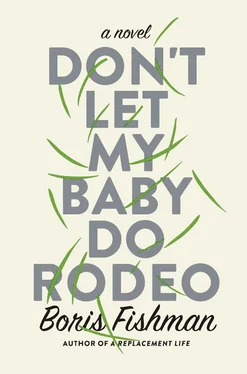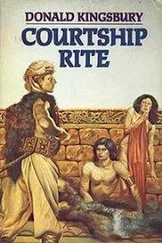She ordered herself to declare, at least, what it was that frightened her on the other side of the flap. Was there a congress of rattlesnakes at the foot of her tent? A boar hooving the dust in anticipation of sinking a tusk into her flank? No, she couldn’t say what exactly she feared in the vacated blackness. Did she fear the vacated blackness? She thought of Uncle Misha. Misha would not be afraid. He would be out under the heavenly firelight, pulling shyly on his rolled cigarette, stamping one foot against the other and back. It startled her to remember that Uncle Misha was alive — declining, her mother said, but alive and cursing away offers of help. He was as remote as the firelight in the sky, Uncle Misha — how could Maya have allowed that to transpire? Her uncle Misha. Was it simply the ocean between them, or had she abandoned them all? Why? Did she want America so badly; the Rubins? Was there any reason she couldn’t have both — that was the sole advantage of Ukraine becoming a free country, she could. Or was her tether to the Rubins so frail that it risked breaking with every departure?
The Rubins rarely asked about her family, though they never expressed negative feelings. Her adopted family was not at fault, even as she loved to hold it responsible. For some reason, Maya had decided that the old family could only come at the expense of the new — and allowed it to drift away in ways easily justified by the distance and time. She still spoke to her mother once a week, but it had been years since she had returned to Kiev, and years since Galina had come to New Jersey to visit her grandson, whose adoption she had greeted with more equanimity than the Rubins. Maya felt a sinking regret. The parched moonscape outside was a solace by comparison: to the regret it added butterflies, as if she were a teenager about to be kissed. It was easier to fear than regret. Fear held out the possibility of being unwarranted, regret meant it was too late. She envied the barrenness outdoors; it struck her now as streamlined purpose rather than desolation. She wished to be equally whittled, to carry not one extra grain.
She flung herself through the flap in the tent. In her boldness, she had forgotten that the flap was zipped — it had been virtually duct-taped by Alex against the encroachment of further intruders, reptilian or human — and she nearly sank the entire contraption. But Alex and Max continued to snooze. With a compensatory guiltiness, Maya unzipped the flap an inch at a time.
Outside awaited a brilliant cold. The corset around her rib cage was replaced by a knife blade. No, something blunter: a dull stone wedged where no stone should go. The hospital had rid her of hypochondria, but the hospital was in New Jersey, and if someone told her that health issues worked differently here — at three thousand feet, zero population, and walls of Oligocene rock — she wouldn’t have argued.
The air drizzled her arms with invisible needles. Was that not a symptom of strokes? She lifted her hands imploringly — there was only so much she could be asked to lose her mind about. If she needed to be felled by a heart attack, two days shy of forty-three, amid this splendor and squalor, so be it. If health issues worked differently here, accountability could work differently also. As in: she abdicated it.
She gulped the air — an unfamiliar taste — and sent it back out in swirling white gusts, the silence roaring in her ears like a hard wind. It was more than a person could take in all at once: the black mirror of the sky shaking with stars, the charging air, the din of the silence. Maya’s head swam, a black rose unfurling under her forehead, but she didn’t want to return to the tent. The raw air was doing work on her dread. It had been working through her since well before sleep — since she had watched the sun sink behind the warped landscape like a mother driving away. The fear was greater inside the tent than outside, the thing finally faced. She was surprised to discover the darkness less complete out here: the dull fluorescent green of an overhead lamp pointing the way to the bathrooms cut into the icy black gleam. She squinted into the darkness, wondering if it would reveal the shape of a man, but there was nothing. Belatedly, it occurred to her that a camper other than Marion might be out for fresh air. Her thinking was holed in critical ways that would not have eluded her attention at home. It was an exhausting, hopeless feeling.
She sank to the ground, crossing her legs under her knees, and closed her eyes. It was hard to do for more than a second — the dread closed in once again. She popped them open. A graveyard stillness, just the handful of tents scattered across the campground, squatters on the infertile plain of an alien planet. But she tried once more, for a second longer. Then again, for a second more still. Her eyes were becoming used to the darkness, which was changing to a bruised violet. After her next try, she saw the orange point of a cigarette hanging in the murk like a miniature fruit. She made out Marion’s faint outline by a picnic table twenty feet away. Her heart leaped, and she lifted a weak hand. It really was as if she had conjured him.
He wore a heavy plaid shirt that looked warm, properly warm for the weather. A gust of wind cuffed her shoulders; she wished she had brought her shawl, but she couldn’t return now. He waved at her and moved from his place. They walked toward each other until they met at two old juniper stumps that belonged to no tent. Even now, probably years after being sawed down, they gave off a faint hint of cedar.
They said hello and stood shyly by the stumps until Marion pointed at them with the tip of his cigarette and they sat. They watched the rock beyond the edge of the campground, the cigarette’s orange point circling the air like a moth. He said nothing, only moved the cigarette in a line from his mouth to his side and then back. After a minute, it fell to the ground, where his boot ground it.
“I don’t think I’ve spent so much time outside in my life,” Maya said. “I have a headache,” she added cautiously, wanting to know was there something to worry about, but unwilling to tempt truly bad news by revealing the extent of her discomfort.
“Oxygen headache,” Marion said. “I couldn’t wait to get back here when we’d go see Clarissa’s family out east.”
She was stung to have been offered his wife’s name so cavalierly. Well, Marion had got the picture when she had told him she and Max weren’t alone. Again, she saw that he was older. A good ten years older than her; in his early fifties.
“You speak about it as if she left you,” Maya said. “But Alma said you left.”
He nodded appreciatively. “Most people take a while to recall which one is Alma and which one is Celia. They don’t help — they wear nearly the same thing. They’re only a year apart. I think they’re shoring each other up.”
“It was difficult for them,” Maya ventured.
He shrugged — with uncertainty, not indifference. “They seemed fine. They approved. At least Alma did. Because they know something’s wrong before you do. It took a while to understand there was more going on. Little things, like Celia’s pig was so hot last summer, but Celia didn’t see it. I had to tell her to hose her down. And she just said, ‘Oh.’” Marion saw Maya’s face and smiled. “She’s in the animal husbandry program at the school. She was going to be a rancher. Maybe not the first female ranch head in Fall River County, but close to it. At six years old, she would have had a hose on that pig in a second.”
“She changed her mind?” Maya said.
“She’s up in the air, she says,” Marion said. “That’s what she says, ‘up in the air.’ It makes me think of her as a kid, I’m throwing her up in the air, and she’s squealing. But this is a different ‘up in the air.’ I wonder if I did that. If I messed with my kid’s certainty.”
Читать дальше












